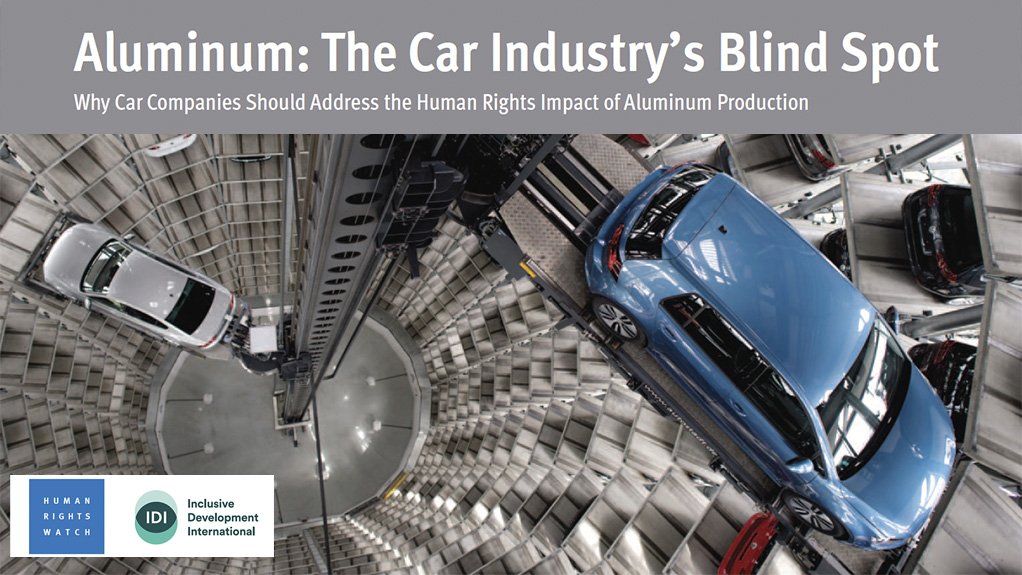- Aluminum: The Car Industry’s Blind Spot – Why Car Companies Should Address the Human Rights Impact of Aluminum Production5.81 MB
Maciré Camara, a widow and mother of five, is a farmer in Diakhabia, a village in the Boké region of Guinea, West Africa. Walking through Camara’s community, it’s hard to imagine the connection between the global car industry and her rural village, where most of the vehicles are beat-up taxis used to ferry people to nearby towns.
Guinea is at the center of an extraordinary boom in bauxite mining, the ore used to make aluminum, a lightweight metal that is a key component of fuel-efficient vehicles. Guinea has the world’s largest bauxite deposits and has rapidly expanded production, growing its global market share from 4 percent in 2014 to 22 percent in 2020. Guinea is now the biggest exporter of bauxite to refineries in China, which produces the majority of the world’s aluminum. Bauxite is also mined in Australia, Brazil, India, and several other countries.
Car manufacturers are major industrial consumers of aluminum, using 18 percent of all aluminum consumed worldwide in 2019, according to the International Aluminum Institute (IAI), an industry group. As car companies transition to electric vehicles, the IAI forecasts that the industry’s demand for aluminum will double by 2050. Aluminum is highly recyclable, but more than half the aluminum used by the car industry is primary aluminum produced from bauxite.
The aluminum industry portrays aluminum as a key material for the transition to a more sustainable world, with the European Aluminum Association, an industry group, saying in a 2018 video that, “The future of mobility is electric…and the metal enabling this green electric future is aluminum.” This image, however, contrasts sharply with the experience of communities, like Camara’s, for whom bauxite mining has had a devastating impact on their way of life.
Prior to the arrival of mining, Camara’s family relied on farming for food and income, planting rice and other crops on the fertile land on the banks of the nearby Rio Nunez river. She could just about afford enough food for her children, earning up to 1.5-million Guinean francs (US$152) per week during a good harvest season and taking home around 10-million Guinean francs per year ($1,010).
Things changed in 2016 when a consortium linked to La Société Minière de Boké (SMB), Guinea’s largest bauxite mining company, began clearing hundreds of hectares of land around Diakhabia to make way for an industrial port. Since 2017, the port has been shipping millions of tons of bauxite each year to refineries belonging to China Hongqiao, the largest aluminum producer in the world. China Hongqiao and other companies who source bauxite from Guinea make aluminum that is eventually turned into components used by some of the world’s largest car companies.
Camara’s family was among the dozens of households in Diakhabia who lost land to the port. The mining consortium paid Camara compensation of just over 4-million Guinean francs ($406) in 2016, a one-off payment that could not replace the land that her family depended on for its livelihood. More than four years later, and without land to farm, Camara has been thrust further into poverty. “I’ve only been able to find half a hectare of land to farm, and I make about 3-million Guinean francs ($303) per year,” she said in December 2020. “We used to eat three meals a day, but now we sometimes have to make do with one or two.” SMB told Human Rights Watch that its projects are audited annually by the Guinean government to verify its respect for human rights and the environment and that it pays fair compensation for the land it acquires.
Report by the Human Rights Watch
EMAIL THIS ARTICLE SAVE THIS ARTICLE ARTICLE ENQUIRY
To subscribe email subscriptions@creamermedia.co.za or click here
To advertise email advertising@creamermedia.co.za or click here











